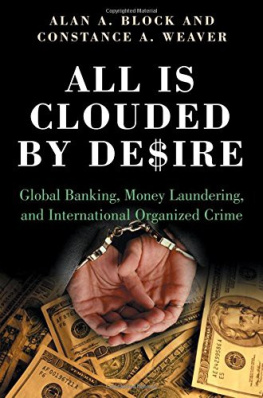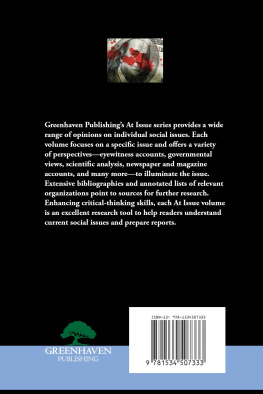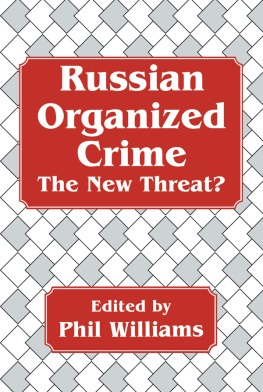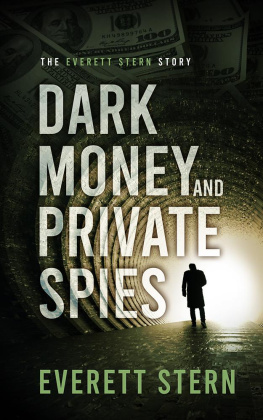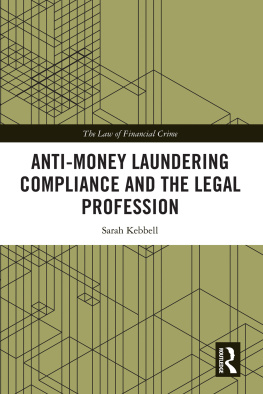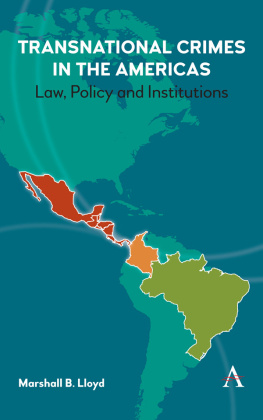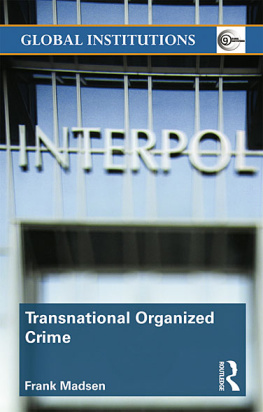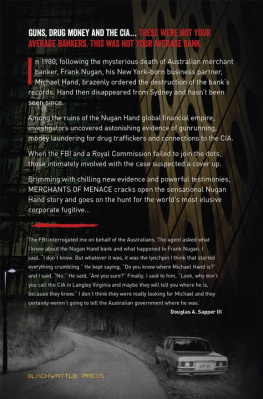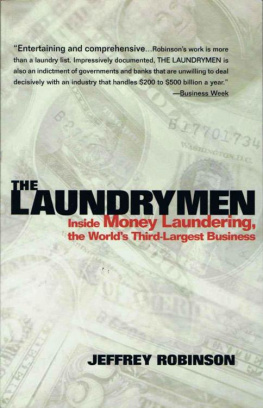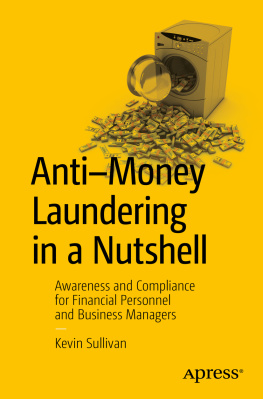All Is Clouded by Desire
Global Banking, Money Laundering,
and International Organized Crime
ALAN A. BLOCK AND CONSTANCE A. WEAVER
International and Comparative Criminology
William J. Chambliss, Series Editor

Copyright 2004
by Alan A. Block and Constance A. Weaver All rights reserved. No portion of this book may be reproduced, by any process or technique, without the express written consent of the publisher. Library of Congress Catalog Card Number: 2004040892 ISBN: 0-275-98330-7 ISSN: 1548-4173 First published in 2004
Library of Congress Cataloging-in-Publication Data
Block, Alan A.
All is clouded by desire : global banking, money laundering, and international organized crime / Alan A. Block and Constance A. Weaver, p. cm.(International and comparative criminology, ISSN 1548-4173) Includes bibliographical references and index. ISBN 0-275-98330-7 (alk. paper)
1. Rappaport, Bruce. 2. Money launderingCase studies. 3. Bank of New York- Corrupt practices. 4. Banks and bankingCorrupt practicesCase studies. 5. Transnational crimeCase studies. 6. Organized crimeRussia (Federation). I. Weaver, Constance, 1949- II. Title. HV6768.B56 2004 364.16'8-dc22 2004040892
British Library Cataloguing in Publication Data is available.
Praeger Publishers, 88 Post Road West, Westport, CT 06881 An imprint of Greenwood Publishing Group, Inc. www.praeger.com Printed in the United States of America
The paper used in this book complies with the Permanent Paper Standard issued by the National Information Standards Organization (Z39.48-1984). 10 9 8 7 6 5 4 3 2 1
For our parents
Lillyan and Harry Block, Diane and Clyde Weaver
and our children
Anne, Colin, Hallie, Dana, Leslie, and Michael
Table of Contents
Cover
Copyright iv
Acknowledgments ix
Preface xiii
PART I 1
Chapter 1 Introduction: The Bank of New York and Bruce Rappaport 3
Chapter 2 The Indonesian Affair: Spies, Lies, and Oil
Chapter 3 The Underworld of Banking and Financial Fraud: Inter Maritime and Castle Banks
Chapter 4 The Antigua Experience: Crooked Banks and Narcotraffickers
Chapter 5 Rappaport at Work: Iraq, Oman, and Iran/Contra
PART II
Chapter 6 The Bank of New York and Rappaport: Together at Last
Chapter 7 Moving Hot Money: Riggs National Bank and Valmet S.A.
Chapter 8 The Criminal Element: Benex and the Red Mafia
Chapter 9 Inkombank and BONY: The Rashomon Effect and the Klein Hypotheses
Chapter 10 Conclusion: The Crisis in Russian Banking and the Character of The Bank of New York
Notes
Index
Acknowledgments
We owe a debt of gratitude to the late David Whitby, whose knowledge of banking and assistance to our project was central; to Ian, Rob, and Smitty, who were our guides to the underworld of private banking; and to a special Swiss friend, who deftly and brilliantly worked with us for many years. Indeed, without their assistance we would likely still be wandering in the wilderness.
Epigraph
If you want to understand Java you have to understand the Wayang, the sacred shadow play. The puppetmaster is a priest. That's why they call Sukarno the great puppetmaster. Balancing the left with the right, their shadows are souls and the screen is heaven. You must watch their shadows not the puppets, the right in constant struggle with the left; the forces of light and darkness in endless balance. In the West, we want answers for everything. Everything is right or wrong, good or bad. In the Wayang, no such final conclusion exists. Look at Prince Ardjuna. He's a hero, but he can also be fickle and selfish. Krishna says to him, "All is clouded by desire, Ardjuna, as a fire by smoke, as a mirror by dust. Through these, it blinds the soul."
From the 1983 film The Year of Living Dangerously,
based upon Christopher J. Koch's 1978 novel of the same name.
Preface
As is often the case, this project came about by pure happenstance. In the early 1990s, an especially adroit journalist friend, Ira Silverman, who was then a senior producer at NBC News, suggested that we might find it interesting to take a close look at the affairs of Mr. Bruce Rappaport, a Geneva banker. Ira hinted that Rappaport was very close to American and Israeli intelligence and had been involved in numerous high-profile international scandals, and there were ongoing investigations into his questionable little banks in Antigua. At the time, Ira was examining Rappaport's involvement with Gaith Pharaon, a prominent figure in the infamous Bank of Credit and Commerce International (BCCI) debacle. And, thus it began. In a serendipitous meeting with another friend, A. J. Woolston-Smith (Smitty), an investigator for the New York State Assembly, we mentioned our budding interest in Bruce Rappaport. As luck would have it, during the 1970s, Smitty had been part of an investigation by the British detective firm Q-MEN, looking into Bruce Rappaport's gargantuan rip-off of the Indonesian state-owned oil company, Pertamina. This caper seriously undermined the economy of Indonesia while making millions for the perpetrators. In addition to suggesting potential leads, Smitty turned over all his notes and documents relating to the case, giving us the first close look at some of the activities of Mr. Rappaport. In 1993, while traveling in Europe, we contacted several Swiss journalists who agreed to discuss Bruce Rappaport and his bank. We learned that Rappaport had a bad reputation in Geneva and that his bank had been under a cloud with the Swiss banking authorities. On a visit to Geneva in the summer of that same year, we had time to spare before our train departed, so we stopped by The Bank of New York-Inter Maritime Bank to see whether we just might be able to meet with Mr. Rappaport. We stated our business and were told that Mr. Rappaport was out of town, but that we could leave a message. We made a quick trip across the way, to the Hotel Beau Rivage, to borrow a piece of stationery on which to write the message. In brief, we explained that we were in town and had hoped to meet with Mr. Rappaport for an interview. Period. After depositing our message with the guard, we left by train for Amsterdam. Here is where things began to get curious. At no time in Switzerland did we mention where we had traveled from, nor where we would be staying in Amsterdam. Yet, when we returned to the small and lovely Hotel Ambassade on the Herengracht, there was a fax from Mr. Rappaport's secretary, saying that since we had apparently already checked out of our Geneva hotel, Mr. Rappaport would be happy to answer any written questions we cared to submit. A quick lesson that this was no ordinary banker and, more importantly, that we were now on Rappaport's radar screen.
Later, in the fall of that same year, we were dinner guests of Mandy Rice-Davies and her husband, Ken Foreman, in Coconut Grove, Florida. Mandy, a novelist, is probably best remembered for her role in the Profumo affair, which rocked Britain's government in 1963. She had moved to Israel, married a man in the nightclub business in Tel Aviv, and thus had come to know something of the Israeli underworld. It was in this setting that she first came across Bruce Rappaport. When we described our research project and asked for a letter of introduction, Mandy refused, noting that she was fond of us and then went on to say, in no uncertain terms, that Bruce Rappaport is a dangerous man, close to Mossad, with a very bad reputation. She strongly urged us to drop the project.
In the mid-1990s, we made several trips to London to interview retired intelligence officers, BCCI principals, and several former Rappaport employees who freely discussed his involvement with American intelligence and BCCI, his crooked banks in Antigua, and his payoffs to President Omar Bongo of Gabon. Back in the United States, still more interviews with former Rappaport employees followed, including a meeting with Jerry Townsend in May 1996. Townsend had been in the U.S. military intelligence and then moved on to the CIA. He told us that he had worked in the Soviet Union and on Middle East oil ventures. Townsend allegedly left the Agency because he was "disgusted with President Carter and CIA Chief Admiral Stansfield Turner." He told us that his next important venture took him to Geneva, overseeing oil contracts, which led to his employment with Rappaport in 1985. Townsend may have been mistaken on the date, however. According to his statement in the BCCI hearings, Townsend began working with Rappaport in 1981 (see BCCI, the CIA, and Foreign Intelligence). He soon became Rappaport's CEO. Another significant source was a former Rappaport chief financial officer who had been with Bechtel before joining the Rappaport organization in the mid-1980s. Both Townsend and the former CFO noted that Rappaport's business practices were bent.
Next page
